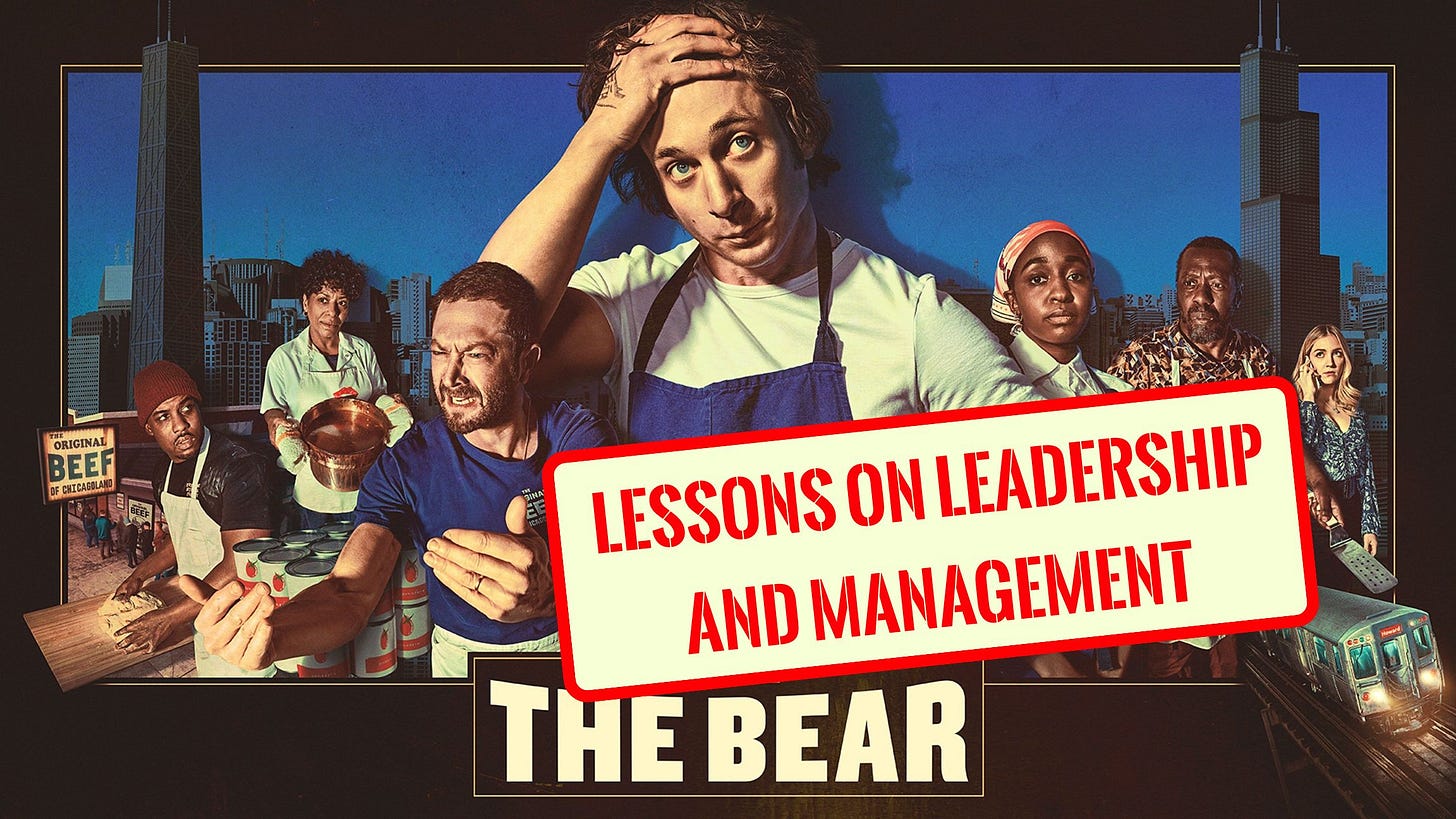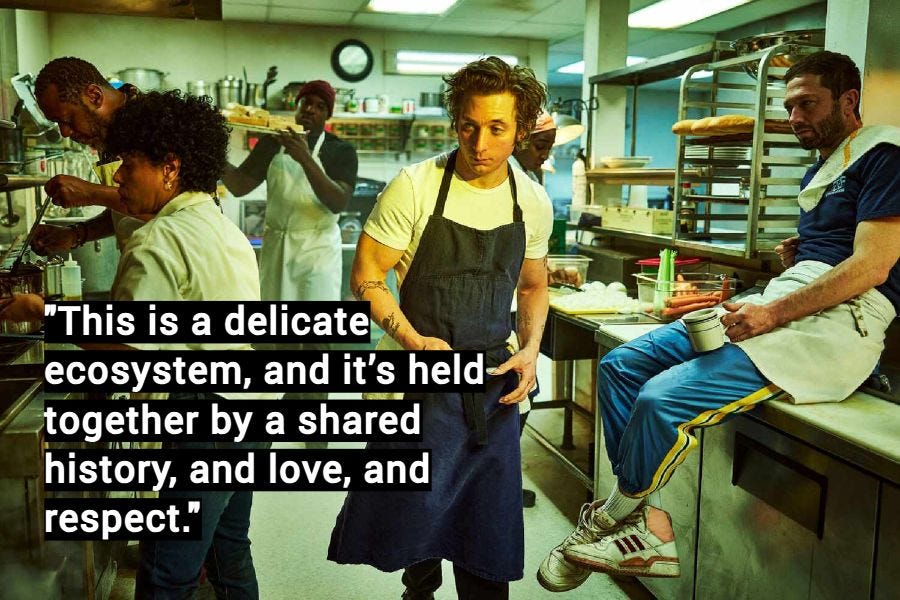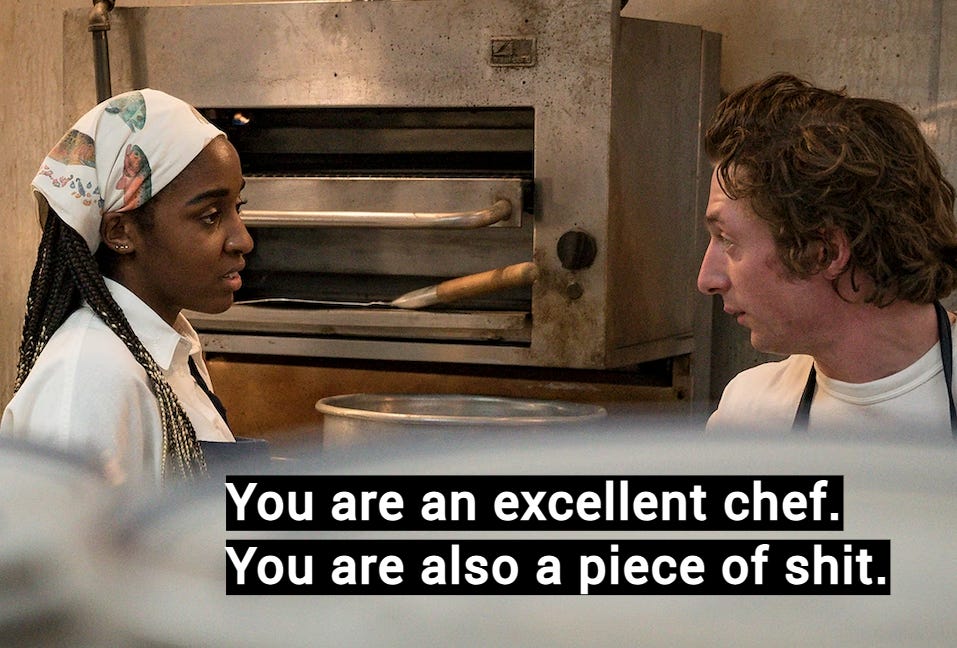‘The Bear,’ lessons on leadership and management - Part 1
‘The Bear’ season 2 just dropped, so I decided the timing was great for me to review what we learned about leadership and management in season 1.
The first season of The Bear starts with Carmen, a young but promising haute cuisine chef, returning to Chicago to take over the family’s shithole sandwich shop after the death of his brother. Carmen finds himself trying to manage an indebted business, a worn-out kitchen, and a few disorderly workers.
So, Carmen is in charge of a product/project in terrible shape and run by a very dysfunctional team. Let’s see what we can learn from this, but first:
Yes, you can follow and enjoy this text even if you have not watched The Bear, but:
There will be some spoilers, not to the point that you can’t enjoy The Bear, but if you are spoiler-phobic, stop reading now and watch the show. It is a pretty good one, but:
Don't watch The Bear if you don’t eat meat. Don’t. Please. Just don’t. You can read this if you don’t eat meat, though :-)
The team is forming and storming
Remember the Tuckman model for teams that we analyzed with Ted Lasso? In The Bear, the team is initially forming as two newcomers arrive: Carmen himself and Sydney, the sous chef he hires in the first episode. As some folks are really unruly and resistant to change, they soon start storming: they fight, disagree, and even sabotage each other. It makes great TV, but it is also painful. It doesn’t help that, on top of all the team changes, Carmen starts a transformation in their ways of working, which takes me to the next item.
Change is hard
Carmen goes from working at the best restaurant kitchen in the world, where I am pretty sure they could extract someone’s appendix without risk of infection, to dealing with sticky floors and rundown appliances. He obviously doesn’t try to convert the sandwich shop into a posh bistro, but he knows he can improve the family business if they implement changes in their ways of working. Yeah, but change is super hard.
While Carmen wants to make changes, Richard, the actual restaurant manager, doesn’t. Both of them are kind of right, actually.
Folks say that if you want to make an omelet, you have to break some eggs. It is also preferred that you break one at a time. Change, by design, will come with some stress, resistance, pushback, instability, and disruption. This is normal, expected, and manageable as long as we are not trying to change too much too fast. If we stress the system to the extreme, it will break. Watch episode 7 of the first season (aka the one where everything goes to hell), and you’ll understand what I am saying.
So, remember, kids: if you are ever hired to lead a transformation project, factor in how you manage change within the organization. Do it sensibly and put to work your communication and leadership skills. Did I say leadership? Ok, let’s talk leadership.
Lead and show how to lead
I feel I say this in almost every post, but here we go: if you are a good leader, you’ll create good leaders. The opposite also applies. Carmen’s manager in New York was a toxic and abusive little turd that insulted and vexed him, so Carmen still had much to learn. Yes, he has great ideas, and he is extremely accomplished, but he is not a great leader (not yet).
Let’s see where Carmen succeeds and where he doesn’t:
He loses his temper quickly. I will refer to the infamous episode 7, where he manages to scare away half the staff.
He could communicate better. For example, when Sydney presents him with the risotto, he refuses to include it in the menu. We later learn why he is correct, but he never explains that to Sydney. A one-minute conversation would have saved them a lot of drama. Well, it created a pretty cool TV conflict, but you don’t live in a TV show, ok?
He doesn’t coach or help Sydney when he puts her in charge of the “transformation.” He goes like: yeah, I know the staff is going to reap you apart and chew your insides like deviled sharks, and I know you are young and you have never done this, but whatever, just go out there and do it. Well, not exactly these words, but you get me. The thing is that leaders don’t kick folks out of their comfort zone. Leaders help to make the comfort zone bigger. Carmen was lucky that Sydney had better leadership skills than him.
Ok, let’s go to Sydney:
Yes, she is young and has a limited amount of experience leading teams, but she certainly has good instincts. Most folks in the kitchen get on board with the changes almost immediately, except for Tina, who goes on a rampage of immaturity and even sabotages Sydney. Remember what we do with difficult stakeholders? Yeah, kinda sorta what Sydney does:
Keep calm, even when she is being insulted.
Keep helping Tina because, at the end of the day, they have the same goal: cook and serve great food.
Show Tina she knows what she is doing and that she might be young but also talented AF.
When Tina does something right, Sidney tells her, no matter how difficult and immature Tina has been all day. You can see how, the moment Sydney compliments Tina, the latter feels motivated and fulfilled and, of course, stops bitching around.
Finally, something that both Carmen and Sydney do pretty well: they support Marcus’ passion, and they allow him to explore and experiment to create fabulous desserts. Even when Marcus gets distracted and causes a blackout, Carmen consoles him and encourages him to focus and keep trying instead of blaming him. Carmen focuses on what Marcus learned instead of what he is guilty of. Carmen here is actually a great leader by fostering an environment free of fear so team members feel safe. It is a pity that he totally destroys that a few episodes later, lol.
One more thing before I finish today, actually related to feeling safe and mental health.
Everyone is dealing with stuff outside of work, be kind
We are human beings 24/7. Most of the time, we try to compartmentalize so that our problems don’t affect work, but unfortunately, we don’t have a switch to go from employees to siblings/partners/parents in a split second. We can’t (and shouldn’t) get rid of our luggage when we step into the office. We must strive for professionalism while applying empathy to foster a work environment where folks don’t need extra effort to remain sane. TLDR, don’t be an asshole. You never know what your co-workers are going through.






